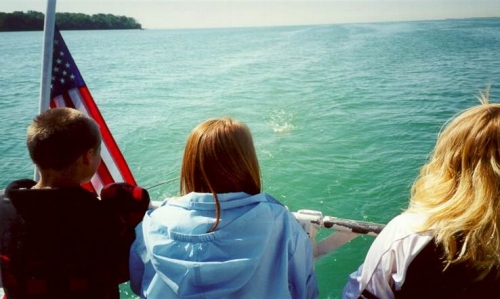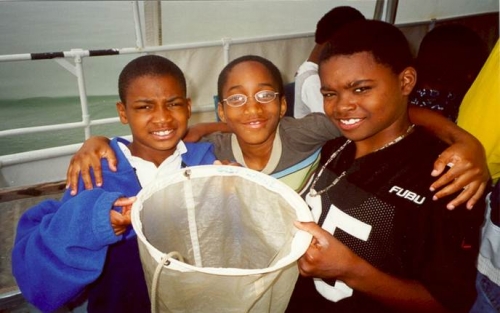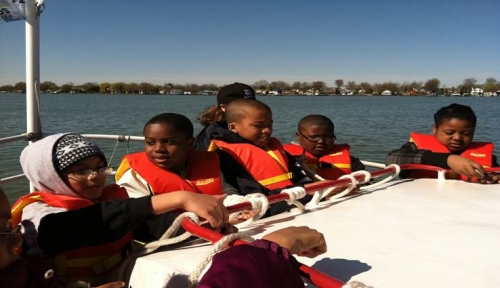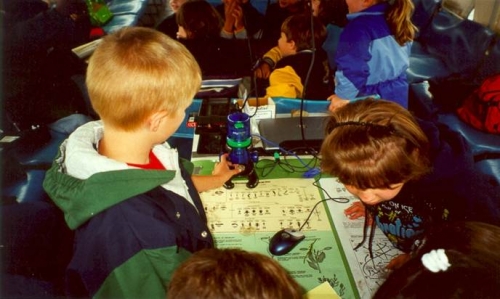Michigan 4-H receives Toyota 4-H2O grant for 4th year to provide water education opportunities
Michigan 4-H received a $65,000 grant to help fund 4-H2O projects and support the 2011 4-H National Youth Science Day.

Students statewide will have the opportunity to participate in real‑world water quality education during the 2011-12 school year after Michigan 4-H received a Toyota 4-H2O for the fourth consecutive year.
The $65,000 grant is split two ways: $50,000 goes to continue the year-long 4-H2O projects in Oakland, Washtenaw and Wayne counties along with a cluster of counties in northeastern Michigan. The remaining $15,000 supports the 2011 4-H National Youth Science Day activities occurring throughout Michigan in early October. The Toyota 4-H20 Project is provided by a grant from National 4-H Council funded by Toyota USA.
Wayne County
The Toyota 4-H2O grant provides students in Wayne County the opportunity to continue hands-on water experiments. Detroit-area schools will continue to engage in the Great Lakes Education Program (GLEP) “School Ship” cruises. The dollars go toward transportation costs and pays each student’s registration fee.
“The program starts in the classroom with teachers and students using the GLEP teacher’s manual,” said Gary Williams, Michigan State University (MSU) Extension educator.
“The manual is designed to prepare students for their GLEP experience. Curriculum focuses on four areas (water, land, people and life) with three phases (pre-crew, crew and post-crew). The manual is designed with activities students can do in the classroom (pre-crew) to prepare for their ship experience. The post-crew manual segment contains follow-up activities to evaluate and expand upon the crew experience.”
And the program provides valuable education to the students about the Great Lakes.
“We must teach children about the flow of water and the importance of the Great Lakes,” said Connie Atkisson, science teacher at O.W. Holmes in the Detroit Public Schools. “Water is a commodity that doesn’t keep multiplying – what’s here is here. If we don’t take care of it, we won’t have it. If these kids don’t see, experience and participate, they won’t know what’s out there.”
“It provides something we could never do in the classroom. Putting the students on the water gives them career choices, and they can see people that do this for a living,” Atkisson said.
On the boat, students learn things such as marine knot tying and water observation, vocabulary used onboard a ship, how to read navigation charts and plan a route. Students also use plankton nets and collection tubes to collect samples and then use microscopes to examine their findings.
Oakland County
Oakland County uses the Toyota 4-H2O grant dollars to fund participation in the “I Pledge My Hands to Larger Service” campaign, an initiative focused on water issues and cleanup efforts. Elementary through high school-aged students learn about ground water, pollution, water quality, watersheds, ecosystems and conducting audits to measure water in their homes and local communities.
The 4-H2O Eco-Challenge summer program is a weeklong camp available to students in August.
“Older students go to Indian Springs Metro Park and learn about ecosystems and how water affects them, and perform water tests and take samples,” said Jason Scott, MSU Extension 4‑H program coordinator.
“They take quantitative water measurements and use technology like digital microscopes to see what type of aquatic life is in their local water. They can also see if the system is healthy or not by performing chemical measurements and testing the pH levels,” Scott said.
Washtenaw County
Elementary to middle school-aged students in Washtenaw County will engage in programs that explore water quality indicators and practice use of non-chemical testing tools and water quality testing samples.
“We pollute with our cars, factories and golf course fertilizers. During the program, students sprinkle colored powder in the water, to demonstrate how pollutants affect our water,” said Jackie Martin, MSU Extension program educator.
In partnership with the Huron River Watershed Council, MSU Extension Washtenaw County 4-H staff members teach participants about community-based water resources such as the Huron, Detroit, Ottawa-Stony and Raisin watersheds.
“This program introduces youth at a young age to the concept that their daily actions can impact our water quality. It makes youth more aware of the things they do on a daily basis,” said Martin.
Northeastern Michigan
Partnering with the Maritime Heritage Center in Alpena, the Department of Natural Resources (DNR) and the U.S. Fish and Wildlife Service, the Toyota 4-H2O program gives students in northeastern Michigan a chance to participate in shipboard learning experiences. Students will conduct water quality tests from Lake Huron, and the Ocqueoc and Trout rivers.
“Shipboard education programs get kids on the water and give them exposure to our partners, fisheries and habitats and how they relate to water,” said Brandon Schroeder, MSU Extension program educator.
The Maritime Heritage component of the program allows students to take a field trip on a glass-bottom boat. Students observe reefs and shipwrecks, conduct chemical analysis, and work with underwater remotely operated vehicles that have been deployed into Lake Huron. Youth also comb through traps with the help of DNR staff members to study the microorganisms that help determine the water quality and to see what small fish are in their local waters.
“Students observe an artificial reef the DNR put together in Thunder Bay and a natural reef that has been negatively affected. They can see the impact that man has on the reef structure and what they can do to help,” said Les Thomas, MSU Extension program instructor. “They hear about reefs and shipwrecks, but now they can see and experience one. They hear about food webs in books, now they can watch them happening. It’s an experience that will last a lifetime.”
Michigan 4-H seeks opportunities to provide water quality-based learning experiences with Michigan youth and families. For more information on events in your area or ways to become involved, contact Jake DeDecker, MSU Extension program leader, at 517-432-7604. Michigan 4-H is an MSU Extension program.



 Print
Print Email
Email



